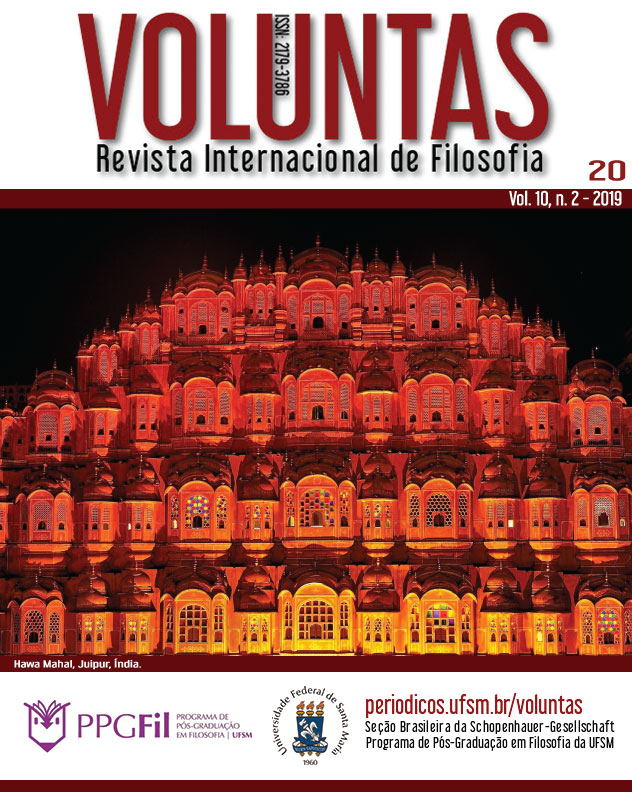Sobre a religião universal em Vivekananda
DOI:
https://doi.org/10.5902/2179378639710Schlagworte:
Vivekananda, Religião universal, Filosofia indianaAbstract
Este artigo analisa o conceito de religião universal em Vivekananda. No Parlamento Mundial das Religiões, o pensador indiano apresenta o hinduísmo e uma fonte teórica para embasar o pluralismo religioso. Ao percorrer suas principais palestras nos Estados Unidos e na Europa, demonstrar-se-á como Vivekananda concebe a religião universal sob a óptica da filosofia Vedānta.
Downloads
Literaturhinweise
BURKE, Marie Louise. Swami Vivekananda in the West: New Discoveries. vol. 1, Advaita
Ashram, 2000.
HALBFASS, Wilhelm. India and Europe. Motilal Banarsidass Publishers PVT. LTD. Delhi, 1990.
HALBFASS, Wilhelm. Philology and Confrontation: Paul Hacker on traditional and Modern Vedanta. Albany, NY: State University of New York Press, 1995.
NAICKER, Suren, Analysis of water-related metaphors within the theme of religious harmony in Swami Vivekananda’s Complete Works. In. HTS Teologiese Studies/Theological Studies, 2016.
SEN, Amiya P. Swami Vivekananda. Oxford University Press, 2000
STROUD, Scott R. The Pluralistic Style and the Demands of Intercultural
Rhetoric: Swami Vivekananda at the World’s Parliament of Religions, In. Advances in the History of Rhetoric, Vol 21, n 3, 2018.
ROLLAND, Romain. The life of Vivekananda and the universal Gospel, 2nd edn, Hollywood: Vedanta Press & Bookshop, 1953.
VIVEKANANDA, The Complete Works of Swami Vivekananda. Volumes 1-9. Estados Unidos: Zhingoora Books, 2012.
Veröffentlicht
Zitationsvorschlag
Ausgabe
Rubrik
Lizenz
Die Einreichung von Originalen an diese Zeitschrift impliziert seitens der Autoren die Übertragung der Rechte zur gedruckten und digitalen Veröffentlichung. Die Urheberrechte für die publizierten Artikel liegen beim Autor, wobei der Zeitschrift das Recht zur Erstveröffentlicheng zukommt. Die Autoren dürfen dieselben Resultate in anderen Publikationen verwenden, wenn sie deutlich auf unsere Zeitschrift als ursprüngliches Publikationsmedium hinweisen.
Lizenz
Creative Commons Namensnennung - Nicht-kommerziell - Weitergabe unter gleichen Bedingungen 4.0 International (CC BY-NC-SA 4.0).






